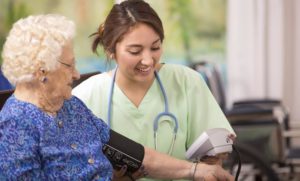Find out what it takes to become a licensed practical nurse
As both the current nursing workforce and baby boomer generation age, hospitals around the country are experiencing a shortage of nursing staff to fill their needs. According to the Bureau of Labor Statistics, the licensed practical nurses (LPN) field is expected to grow 12% by 2026.
LPNs are compassionate and detail-oriented leaders. If the thought of using your skills and education to positively impact the lives of other people inspires you, then enrolling in an LPN program could be your calling.
What do LPNs do?
As an LPN, you’ll be a valuable asset to your health care team. Your duties may slightly vary depending on where you work, but many of the essential responsibilities will stay the same. LPNs perform basic bedside care and take vital signs of their patients like temperature, blood pressure, and pulse measurements. LPNs also provide direct patient care like preparing IV drips for adults and performing wound care. Pediatric LPNs feed and care for small infants and monitor their progress, as well.
You can expect to do some administrative or clerical assistance behind the scenes, as needed. This includes tasks like making appointments and entering electronic health records. As an LPN, you will typically report to a physician or registered nurse day-to-day. However, you may also be responsible for supervising nursing assistants or aides.
Where do LPNs work?
There are a variety of work settings available for LPNs to choose from. Just because nursing homes and residential care facilities are the most common routes for LPNs, they aren’t your only options. As an LPN, you can choose to work in specialty practices like dermatology, endocrinology, cardiology, or pediatrics. With an industry that is growing in need, you may have the luxury of choosing where you feel the most motivated and prepared.
Why an LPN program?
The LPN program at Professional Skills Institute combines classroom learning in core nursing subjects like medical terminology, anatomy and physiology, and pharmacology with hands-on training. A hands-on approach engages you in your work and gives insight into what it’s like to be an LPN. Working in actual medical facilities with an established healthcare team through on-site clinical learning will prepare you with the on-the-job skills employers need.
The time between your first day of class in an LPN program to the day you pass your NCLEX-PN exam, can take less than two years. This accelerated learning format gets you to work faster, gain experience sooner, and allows you to start earning a steady income after graduation.
To learn more about our LPN program, schedule a visit today to our campus by calling 800-216-5770.



